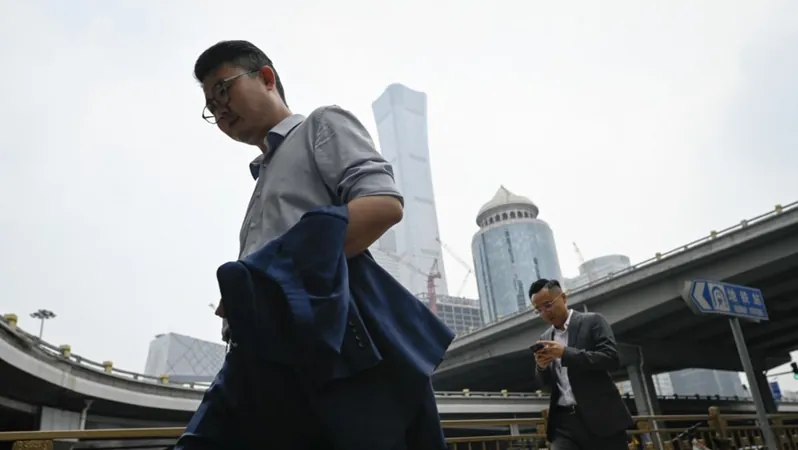
China Prepares Major Stimulus Package as US Elections Loom – What You Need to Know!
2024-11-04
Author: Rajesh
China's Economic Stimulus Strategy
In a critical meeting that began on November 4, China's top lawmakers are strategizing a massive economic stimulus package, with timing tightly aligned to the outcome of the U.S. presidential elections. Analysts speculate that the size of this package could swell significantly, especially if former President Donald Trump secures a return to the White House.
Recent Economic Support Initiatives
China's government has recently intensified its economic support initiatives after enduring years of stagnant measures. These include interest rate cuts and relaxed home buying rules, designed to bolster a struggling economy. Yet, the lack of a concrete figure for the stimulus has frustrated investors, leading to a premature end to recent financial market rallies.
Anticipation for NPC Announcement
Expectations are high that the Standing Committee of the National People’s Congress (NPC), China’s principal legislative body, will unveil a figure during this week’s sessions. Economic experts from Nomura anticipate that lawmakers could approve approximately one trillion yuan (around US$140 billion) in additional funding. The announcement is expected to coincide with the conclusion of the NPC meeting on Friday, giving Beijing a chance to gauge the results of the U.S. elections.
Potential Impact of U.S. Elections
The electoral landscape is perilous; both Trump and his rival, Kamala Harris, have vowed to adopt a tougher stance towards China. Notably, Trump has floated the idea of imposing a staggering 60% tariff on all imports from China. Nomura’s chief economist, Ting Lu, suggested that the size of China's stimulus could increase by 10 to 20% if Trump wins.
Focus on Addressing Non-Performing Loans
As lawmakers deliberate, attention is focused not only on direct stimulus measures but also on a significant, one-time allocation of one trillion yuan intended for banks to address non-performing loans accumulated over recent years. However, experts express concerns that much of this funding might merely cover losses, rather than mobilizing genuine economic resurgence.
Concerns Over Economic Recovery
Despite the proposed measures, economists like Alicia Garcia Herrero from Natixis urge caution, indicating that these efforts might be more about staving off further decline than inspiring robust recovery. Similarly, Yeap Jun Rong from IG echoed this sentiment, highlighting that strategies appear more geared towards regulatory rectification than fostering growth.
Challenges Facing China's Economy
China is currently grappling with several critical challenges: sluggish domestic consumption, persistent issues in the property sector, and a soaring government debt load—all potential roadblocks in reaching the government’s growth target of 5% for the year. With the property sector traditionally serving as a growth engine, its current debt-laden state threatens broader economic stability. Despite a slight uptick in new residential property prices, the overarching crisis remains, with estimates suggesting repurchasing unsold housing units could cost Beijing up to 3.3 trillion yuan.
Local Government Debt Scrutiny
Local government debt management is set to come under scrutiny during the NPC meetings, with new mandates requiring authorities to report their financial situations annually. However, the roots of China's economic difficulties extend beyond local governance mishaps. Garcia Herrero pointed out that the economy suffers from systemic issues linked to poorly allocated resources and unsustainable industrial policies.
Global Economic Dynamics at Stake
As the world watches closely, the outcome of both China’s legislative decisions and the U.S. elections may significantly reshape global economic dynamics in the coming weeks. The stakes are high, and only time will tell how these interlinked developments will unfold.



 Brasil (PT)
Brasil (PT)
 Canada (EN)
Canada (EN)
 Chile (ES)
Chile (ES)
 España (ES)
España (ES)
 France (FR)
France (FR)
 Hong Kong (EN)
Hong Kong (EN)
 Italia (IT)
Italia (IT)
 日本 (JA)
日本 (JA)
 Magyarország (HU)
Magyarország (HU)
 Norge (NO)
Norge (NO)
 Polska (PL)
Polska (PL)
 Schweiz (DE)
Schweiz (DE)
 Singapore (EN)
Singapore (EN)
 Sverige (SV)
Sverige (SV)
 Suomi (FI)
Suomi (FI)
 Türkiye (TR)
Türkiye (TR)